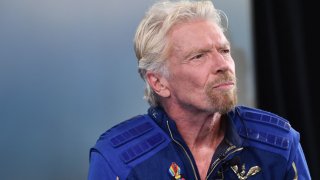
Sir Richard Branson speaks after he flew into space aboard a Virgin Galactic vessel, near Truth and Consequences, New Mexico on July 11, 2021.
"Do what you know" is common career advice, but not everyone agrees it's wise. Virgin Group co-founder and billionaire Richard Branson says it's the worst career advice he's ever received.
In fact, Branson broke through by doing the opposite, he discussed on a recent episode of the Work Life with Adam Grant podcast. "Most of my successful businesses were in industries where I had no industry experience at all," he said.
Stream NBC4 newscasts for free right here, right now.
Branson — who has a $2.6 billion net worth, according to Forbes — built his career and fortune from the Virgin Group, a venture capital and holding company. The conglomerate started over five decades ago, when Branson co-founded Virgin Records.
While Branson sold the music label for nearly $1 billion in 1992, the Virgin Group now owns companies in sectors ranging from airlines and hotels to media and spaceflight.
We have the news you need to know to start your day. Sign up for the First & 4Most morning newsletter — delivered to your inbox daily.
Grant, a Wharton organizational psychologist, said exploring new projects and fields is smart: People who stay in a single, familiar industry sometimes develop "cognitive entrenchment," he said.
In other words, as employees and scholars gain expertise, they can lose "flexibility with regard to problem-solving, adaption and creative idea generation," according to research from Rice University published in 2010.
Instead, "when you're fresh to an industry, from the outside, you get that ability to see what's taken for granted and challenge it," Grant told Branson on the episode.
Money Report
Thinking of himself as more than 'a pure businessman'
Branson doesn't like to feel limited by conventional wisdom in general, or by labels. He finds it "insulting" to be introduced as a billionaire, for example, and instead of seeing himself as a businessperson or entrepreneur, he defines himself primarily as "somebody that loves to create things that I can be proud of," he told CNBC Make It last month.
The mentality, he said, helps him focus on the quality of ideas, rather than their earning potential. "There's many things that we've done that wouldn't have done if we'd listened to accountants," Branson said.
Those ideas haven't come without risk and costs: Virgin Galactic, the group's spaceflight company, had to trim staff and temporarily suspend commercial flights after it posted a loss of $502 million last year.
"If I was a pure businessman, then I would never have decided to go into space," Branson told Make It.
When Branson does want to dip into a new industry or business venture, he bases the decision on three criteria: If he can make a better version than what already exists, if his version could make a difference in the world, and if the results can "be something that we can all be very proud of," he added.
Want to be a successful, confident communicator? Take CNBC's new online course Become an Effective Communicator: Master Public Speaking. We'll teach you how to speak clearly and confidently, calm your nerves, what to say and not say, and body language techniques to make a great first impression. Sign up today and use code EARLYBIRD for an introductory discount of 30% off through July 10, 2024.
Plus, sign up for CNBC Make It's newsletter to get tips and tricks for success at work, with money and in life.






